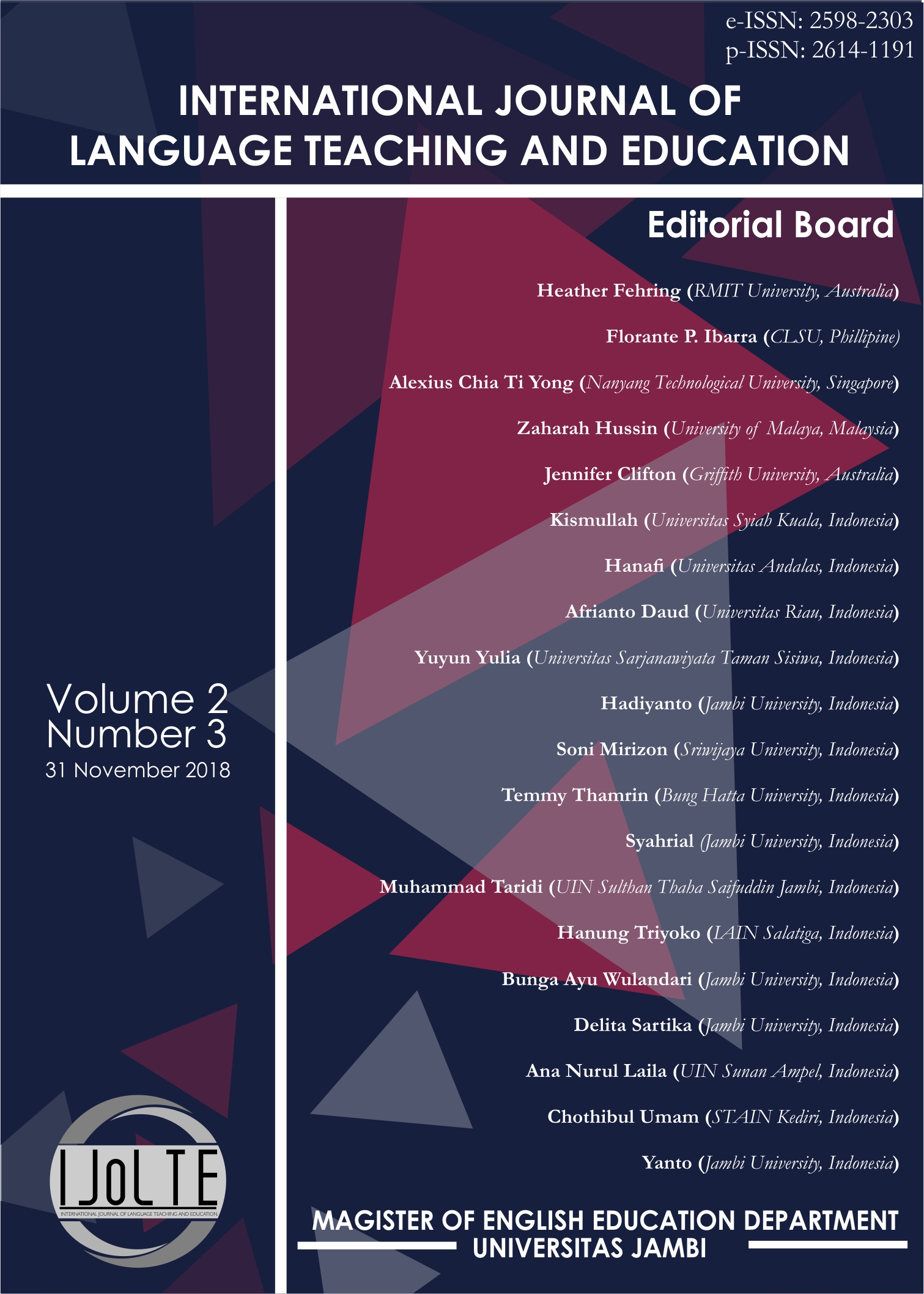Computer-Based Software for Grammar Test: What The Students Think about It?
DOI:
https://doi.org/10.22437/ijolte.v2i3.5754Keywords:
Computer-Based Software, Grammar Test, PerceptionAbstract
A test is conducted to know the students’ competencies toward the material that they have been learned. Making the test is not easy because the lecturers have to consider the material or skill which will be tested, in this case is grammar. The lecturers also must use the test media which is appropriate and interesting. Nowadays, the utilizing of technology in education context has increased, especially in conducting the test. The aim of this study is to show the students’ perception toward computer-based software for grammar test. The method used in this research is qualitative method with descriptive analysis design and also used quantitative method for questionnaire data. The participants were from 40 English department students in one of university in Serang. The data were collected from questionnaire and interview with some students. The result shows that almost all students give positive response and perception toward computer-based software for grammar test. The students become more interesting to do the grammar test with the computer-based software and they are facilitated in conducting the test because they get benefits from it.
Downloads
References
[2] Lock, Graham. (1995). Functional English Grammar: An Introduction for Second Lan-guage Teachers (Cambridge Language Education). Cambridge Language Education: Cambridge University Press.
[3] Luecht, R. M., & Sireci, S. G. (2011). A Review of Models for Computer-Based Testing. CA: College Board.
[4] Madsen, H. S. (1983). Techniques in Testing. New York: Oxford University Press.
[5] Pardo, A. M. (2014). Computer-Based vs. Textbook-Based Grammar Instruction: Effec-tiveness and Students’ Perceptions. Thesis. Máster Universitario en Formación del Profesorado de Educación Secundaria (UPNA).
[6] Saraswati, Dyah. (2015). The Use of Board Game to Improve Students’ Grammar Mas-tery. Thesis. IAIN Salatiga.
[7] Thurlow, M., Lazarus, S. S., Albus, D., & Hodgson, J. (2010). Computer-based testing: Practices and considerations (Synthesis Report 78). Minneapolis, MN: University of Minnesota, National Center on Educational Outcomes.
Downloads
Published
Versions
- 2018-12-01 (1)
- 2018-12-01 (1)
How to Cite
Issue
Section
License
The Authors submitting a manuscript do so on the understanding that if accepted for publication, copyright of the article shall be assigned to International Journal of Language Teaching and Education (IJoLTe) and Magister Program of English Education Department, Universitas Jambi as publisher of the journal. Copyright encompasses rights to reproduce and deliver the article in all form and media, including reprints, photographs, microfilms, and any other similar reproductions, as well as translations.
IJoLTe keep the rights to articles that have been published. And, the authors are permitted to disseminate published article by sharing the link of IJoLTe' website. Authors are allowed to use their works for any purposes deemed necessary without written permission from IJoLTe with an acknowledgement of initial publication in this journal.
IJoLTe and Magister Program of English Education Department, Universitas Jambi, and the Editors make every effort to ensure that no wrong or misleading data, opinions or statements be published in the journal. In any way, the contents of the articles and advertisements published in IJoLTe are the sole and responsibility of their respective authors and advertisers.
If the article was jointly prepared by more than one author, any authors who submitting the manuscript warrants that he/she has been authorized by all co-authors to be agreed on this copyright and license notice (agreement) on their behalf, and agrees to inform his/her co-authors of the terms of this policy. IJoLTe will not be held liable for anything that may arise due to the author(s) internal dispute. IJoLTe will only communicate with the corresponding author.
By submitting the article/manuscript to this journal, the authors agree with this policy and consciously agree that IJoLTe does not provide royalties or other fees to the authors for their published articles. By agreeing this policy, IJoLTe ensures that published articles are publicly accessible and will be free of charge for the readers. No specific document sign-off is required.
Users of this website will be licensed to use materials from this website following the Creative Commons Attribution 4.0 International License. Please use the materials accordingly
You are free to:
- Share — copy and redistribute the material in any medium or format
- Adapt — remix, transform, and build upon the material for any purpose, even commercially.
- The licensor cannot revoke these freedoms as long as you follow the license terms.








1.png)
